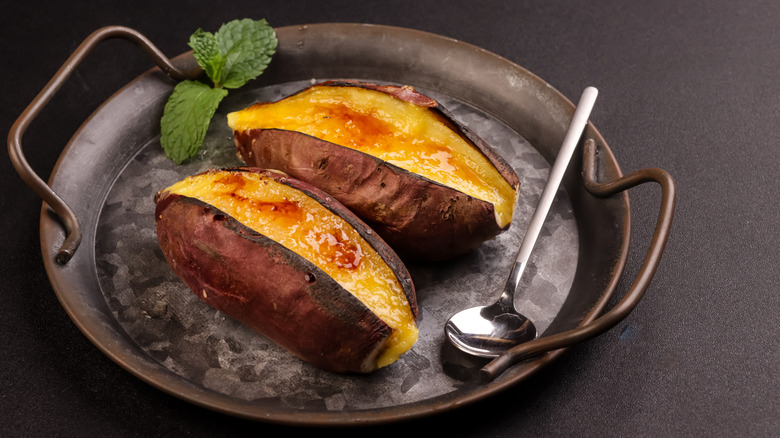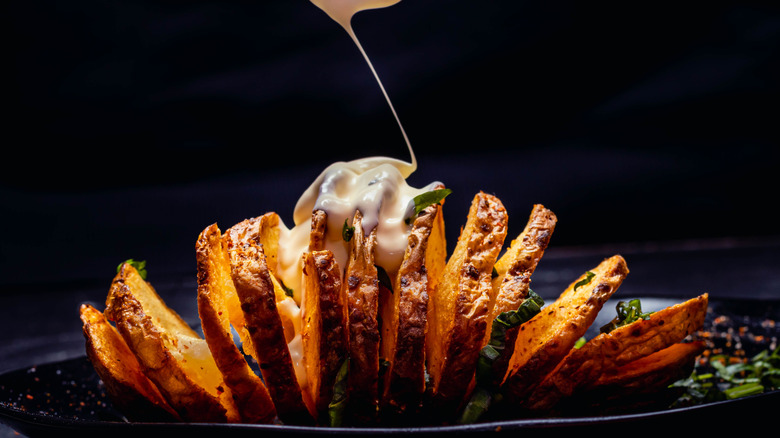The Controversial Tip For Ultra-Creamy, Caramelized Sweet Potatoes
From throwing salt over your shoulder to watching your pot of pasta water boil in vain, there are as many kitchen myths as there are recipes in the world's best restaurant cookbooks. But some culinary superstitions have a basis in reality: You can salt pasta water too soon and season your eggs too late. And, as it turns out, your baked potatoes can explode in the oven or microwave — although, to be fair, it is quite rare.
When speaking with Food52, University of Idaho School of Food Science faculty member Brennan Smith explained why pricking a potato's skin before it bakes isn't superstitious behavior after all. "The skin acts like a pressure vessel. If you don't let the steam escape, it builds up pressure," he said. "If it gets to a certain point of pressure from the water trying to become water vapor, it can pop the skin."
However, at least for fluffy, sugary sweet potatoes, that pressure-cooked, steamy interior happens to taste exceptionally delicious. The trapped water and sugar soften a sweet potato's interior, making it practically ready to eat right out of the oven. Plus, the built-up steam presses against the sweet potato's skin, slightly separating it from the orangey insides, which makes it remarkably easy to peel. So what's a home cook to do? Should you prick your sweet potatoes to avoid a potential explosion? Or let them cook, controversially, with all that helpful steam inside? Luckily, for those of us looking to avoid the threat of a mess while still enjoying the best spud possible, there's a helpful middle road: Leave your sweet potatoes unpricked when roasting them on low.
How to create the creamiest sweet potatoes without stress
A sweet potato's skin can do all the heavy lifting, turning firm flesh into a soft mash and sharp sweetness into a rich caramel flavor. Where most home cooks go wrong when making sweet potatoes is simply letting them get too hot. Impatient (or hungry) chefs might turn up their oven's heat to see faster results. And while the potatoes will cook faster, the rapid ramp up in temperature will lead to quicker cracks in the skin and a less flavorful spud. Instead, practice patience when preparing sweet potatoes by roasting them on low for a longer period of time. You'll love the silky smooth results. Sweet potatoes can be cooked for too long though, so be sure not to take your eyes off the prize. If you see a single crack form, take them out of the oven to prevent that aforementioned explosive mess.
If you'd like to try this slow-steaming method but prefer to err on the side of caution, look for smaller-sized potatoes with more surface area. To ease your concerns, you can poke a few small holes for some venting, but try not to go overboard or you'll lose your chance at steamed success.
However, if you're in a hurry and hope to par-cook your potatoes in the microwave, this is not the moment to try the slow-steaming method. Microwaves heat up much more quickly so a potato's steam won't have time to seep out slowly (leading to a much faster rupture). So if your potatoes are destined for the countertop appliance, go ahead and poke several holes in them to be safe. Otherwise, try the low-and-slow oven method for deliciously rich results.

